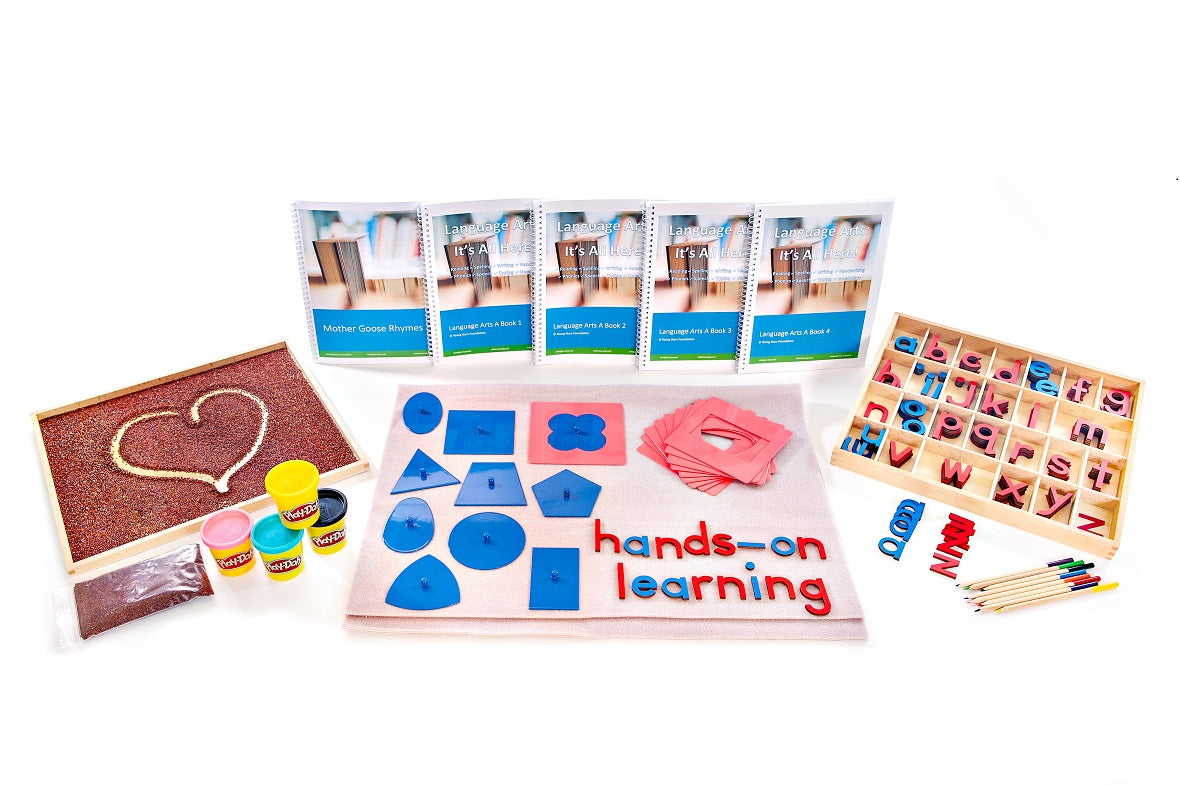How to Approach Homeschooling with Skeptical Family Members Around the Thanksgiving Table
Choosing at home education is not a decision taken lightly. We put in hours of research to find the best homeschool curriculum. Every day we give of our time to ensure our children are learning. It’s a journey of discovery, learning, and growth - for us and our children!
It is also a journey many outside the home education community do not understand. Some people may criticize or make false assumptions about our choice and what we actually do. For home educators, the holidays - especially Thanksgiving - can turn into an emotional day of inquisition from skeptical family members. We are here to provide you with a few tools today to help guide your conversations.
How to Approach Homeschooling with Skeptical Family Members Around the Thanksgiving Table
-
Common Scenario #1- Skeptical family member quizzes homeschool students on facts. A family member may make comments about what the student “should” know.
Advice: It may be a good idea to have a conversation with your children before your family gathering. Equip them with responses or prepare them that it may happen. Make sure they know they may share any information they like but are not obligated to do so. This will, of course, depend on the age of the student and how comfortable they feel talking with adults.
One option might be: “I’m not sure about the answer to that but let me tell you about…” They can then share something interesting they’ve been learning. Or they may politely respond with “After we enjoy our meal, I can show you some of what I’ve been working on.” It may also be a conversation a parent needs to intervene in. Respond with a spirit of love remembering home education is a foreign concept for a lot of people. Also, remember children in public schools are used to being quizzed.
Quick Exit: You might respond with, “We don’t typically quiz (name) as part of our schooling so they're a bit unfamiliar with how to respond. (Name) would you like to share something you’ve been learning?” or “Thank you for showing an interest in what we’re studying in school. We’ve recently been learning about… ”
Avoid it all together: Have your students prepare a brief presentation or bring materials or a completed project. Let relatives know ahead of time the students would like to share what they've been learning with interested family members. If you feel you need to, let them know your preference is for the children to not be “quizzed” about school. This way they can show curious relatives what homeschooling is like. It also gives students the chance to take pride in showing off their work. Grandparents especially love to see what kids have been working on.
-
Common Scenario #2: Relative says something like “I don’t know HOW you do it. I could never homeschool my children.
Advice: First of all, remember your children are listening to hear how you respond. Yes, there are days we consider dropping them off at the nearest public school. Yes, there are days we feel ill-equipped and are floundering. Yes, there are days we feel like we can’t do it after all. Our children are listening to how we respond. Respond with words of life, joy, truth, and love. Build up your kids and their hearts. And respond with words that build up the other parents to know they could do it and thrive too!
Quick Exit: “I felt that way too. It’s been a delight.”
Avoid it all together: Share a tidbit from a homeschool group or forum about how you’re comforted with the reminder most homeschool parents jump in without any teaching background. You could also share how much you’ve been learning too as a home educator.
-
Common Scenario #3: Relative asks if you’re afraid home education will destroy their love for learning.
Advice: This tends to be a big one for people. A lot of families choose to homeschool because they worry public school will destroy a love of learning. This is a subject that can lead to an argument about school structure. Tread lightly and share the joy your children find in learning. Describe how their eyes light up when they learn. Share how they work on school work during free time. Tell how much YOU’RE loving it compared to the educational experiences you’ve had before!
Quick Exit: “No.” Plain and simple :)
Avoid it all together: Share how glad you are about the decision to homeschool. Tell details about a moment of particular joy in learning. Share how your child starts school alone. Or how they get excited waiting for you to finish breakfast dishes.
-
Common Scenario #4: The dreaded “socialization” word comes up.
Advice: This is another topic that can turn into an argument. You know your audience best. One approach might be to share fun outings, coops, nature groups, etc you’re involved in. Another approach might be to say you don’t feel like children in school get much time to visit with friends in a relaxed setting. Or there’s always the snarky response of “We socialize dogs, we build children’s relationships.” Buuuuuut that one doesn’t go over in a lot of crowds. Or turn it around and ask “What does socialization mean to you?”
Quick Exit: ”That’s a common stereotype of home education and we’re not concerned about it.”
Avoid it all together: Share about your children’s friends and activities.
-
Common Scenario #5: Teacher becomes defensive that you’ve chosen to reject formal schooling.
Advice: Again, this is another tread lightly and you know your audience scenario. Teachers, and parents who adore their public school, often get defensive. To be honest, when I used to teach I did too. I thought homeschooling was irresponsible. 15 years ago I would have said there was no way I’d ever homeschool. Share your “whys” in a loving way. Give examples of experiences you’ve been able to have that school wouldn’t have allowed.
Quick Exit: If it’s something you truly feel, try a comment like: “You know, I’d be more inclined to send my children to school if more teachers were like you.”
If you think it will escalate into an argument, “I think this may be a topic that’s best we agree to disagree about and enjoy our meal.”
Avoid it all together: If the topic seems to be creeping that way, change the subject. Or comment on how nice it is to have another educator around and ask questions about the classroom, favorite subjects to teach, etc.
-
Common Scenario #6: Other children at the meal think homeschooled kids are “weird.”
Advice: Depending on the age and self-esteem of your children- this may be one to prepare them for. Not only on Thanksgiving but as a homeschooler. This seems to be a common misconception. Most likely, this would come up while you are out of earshot and shared to you by a tearful child later on. You could talk to your student about stereotypes and how they’re not true. And tell your child all the things you love about them. I think this stereotype may come because homeschoolers are viewed as not culturally aware. (I could write an entire blog about this!)
Quick Exit: If you overhear children calling names, intervene as necessary.
Avoid it all together: Chat with other parents before the meal. Ask them to tell their children what homeschooling is. It could be helpful for you and the parents to find common interests between children for them to know about ahead of time. If they can bond over a shared interest, your homeschoolers is “relevant." Plus kids always get along better with a shared interest.
Common Scenario #7: Concern is raised that kids aren’t getting “enough” learning.
Advice: Students in public school are gone 7-9 hours per day. Teacher spend 25%-50% of their day doing behavior management, managing transitions, and other tasks that aren’t necessarily teaching. You could throw out stats or respond a bit about your educational philosophy.
Quick Exit: “We’re all happy with our schedule and the kids are thriving!”
Avoid it all together: Stay away from information about your daily schedule.
Common Scenario #8: Guests assume you have to follow traditional stereotypes such as you grow your own food, grind your own flower, raise chickens, have a big family, etc. to homeschool.
Advice: If I had a dollar for every confused person when they found out I homeschool an only child. The stereotypes about a homeschool family abound. Share how home education is growing across all family sizes, religions, lifestyles, cultures, etc. Keep it polite and thoughtful. Or turn to humor and make a joke. I also know many of us do fit some portions of the stereotype. If they ask about some way it applies to you, share it or make a joke depending on your personality. :)
Quick Exit: “You know? I have yet to meet a homeschool family who fits the traditional stereotype.”
Avoid it all together: Stereotypes stick and they stick strong. This is one people are likely to at least joke about. Remember it’s not a personal attack or insult. It’s the human mind and societies attempt to classify something they don’t understand. Only by open and honest truth can we break any stereotype.
-
Common Scenario #9: The age-old homeschool question of “How will they succeed in college if they’ve never been in a classroom?”
Advice: This is one every homeschool family has to tackle on their own at some point. If your children are still young, you can say it’s something you’ll consider more when they are older. Or share ways other homeschoolers have approached this such as- sending kids to high school for courses such as chemistry and AP courses, taking classes at the local community college, starting a small business as a teen that does not need a degree or jumping right into college. (Hint- on the last option, most students thrive because they’re used to self-study already!) This would also be a good one to turn back around and ask, “I’m curious what it is about home education that makes you think it would be hard for them.”
Quick Exit: “We’re not worried about it. (Name) has excellent learning skills!)
Avoid it all together: Give your older teen a chance to share how they’ve been preparing for college.
I hope these scenarios have been helpful for you. The Thanksgiving table can, unfortunately, become a place of stress and fights. Remember to keep things in a spirit of love. Also, remember you don’t have to defend yourself to anyone. The choice for home education is what you have decided is best. If the conversation gets heated or you feel uncomfortable, shut it down with that reminder. I hope you won't need any of this advice and you’ll have a fun Thanksgiving meal- but I’m glad to provide it in case you do!






